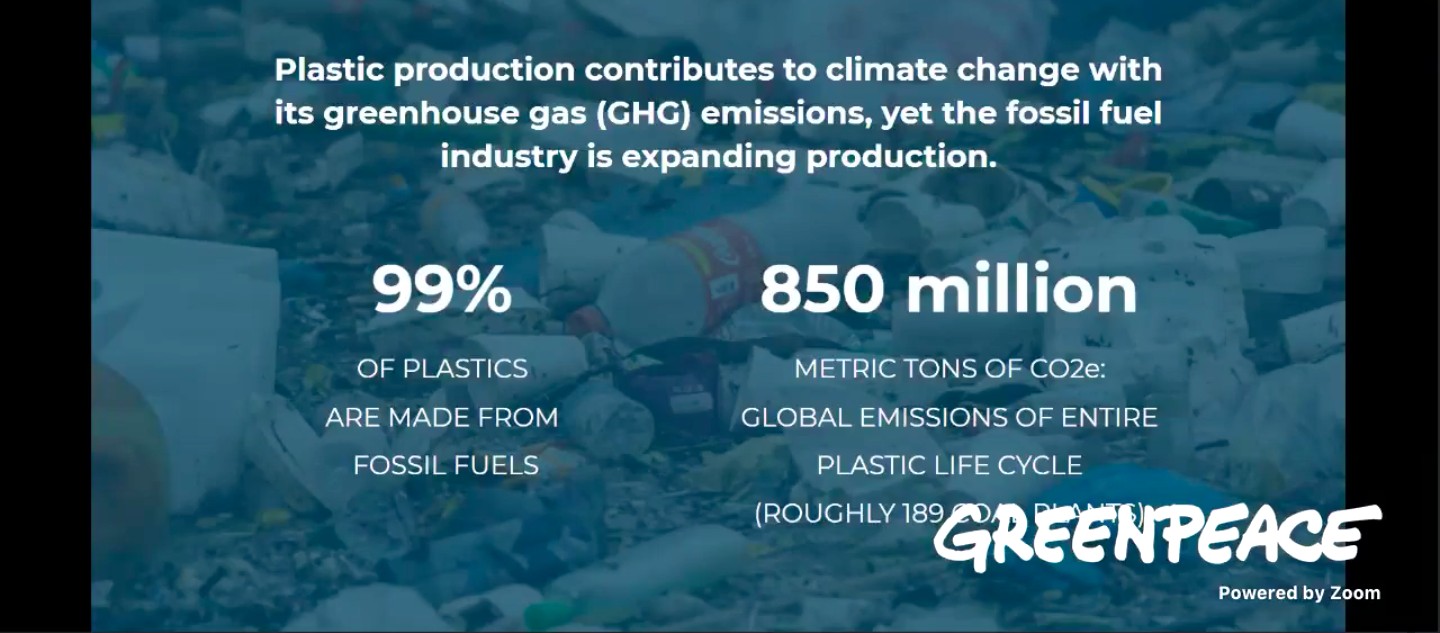
September 17, 2021 Friday

MANILA, 18 September 2021 — The Climate Change Commission welcomed the release of a Greenpeace report baring the link between plastics and fossil fuels and urged advocates to help raise awareness and public support for measures to address single-use plastics during a roundtable discussion titled "Unwrapping the Climate Crisis" held Thursday, September 16.
“We very much welcome this effort to give the Philippines and the world a clearer picture of the link between the industries of consumer goods and of fossil fuel, and how plans to expand plastic production—which is a major driver of climate change—directly threaten our communities, and could derail our work to achieve global climate commitments,” said CCC Commissioner Rachel Anne Herrera, who joined other climate, sustainability, and health experts during the roundtable discussion on Greenpeace’s report, ‘The Climate Emergency Unpacked: How Consumer Goods Companies are Fueling Big Oil's Plastic Expansion.’
“The CCC is taking urgent note of the report’s key findings and your recommendations,” Herrera emphasized, who highlighted the recent passage of the Single Use Plastics Regulation Act in the House of Representatives, and urged participants to help raise awareness and gather more public support for the measure.
“Concretely, this report also means the big consumer brands must address the matter of transparent reporting along with laudable initiatives they have started on redesigning packaging, zero waste, and plastic neutrality. As with the government requirement for companies now to adhere to sustainability reporting, we fully support mechanisms for full disclosure of GHG emissions of the overall supply chain," she added.
Greenpeace Philippines’ Zero Waste Campaigner Marian Ledesma presented the key findings and recommendations of the report during the discussion, which was co-presented by Greenpeace Philippines, Living Laudato Si’, Planetary Health Philippines, and Break Free From Plastic.
“The Philippines faces some of the harshest and most severe climate impacts annually. On top of that, our nation also struggles with plastic pollution. The plastic crisis is adding its own set of environmental, health, and social problems that Filipinos have to grapple with. We’re literally drowning in plastic, and it’s not manufacturers or big brands that are paying the price, but our own communities,” Ledesma said.
“Government can encourage the phase out of single-use plastic and adoption of reuse by legally binding legislation and policy measures,” Ledesma added, along with other recommendations from the report, including calling on governments to support a global treaty on plastic, work with communities most impacted by plastic production and pollution, and pursue a zero-waste economy.
In his response to the report, Dr. Renzo Guinto, Associate Professor of the Practice of Global Public Health and Inaugural Director of the Planetary and Global Health Program of St. Luke’s Medical Center College of Medicine, called plastic a “symbol of the deterioration of our relationship with Mother Earth, of the deterioration of planetary health.”
“Plastic not only impacts the health of the environment, it certainly impacts the health of people as well,” Guinto emphasized, citing the 7 million deaths caused by air pollution annually, as well as the long-term of effects of the climate emergency on global nutrition.
“It’s quite alarming to hear the numbers. Unfortunately, we are still continuing to produce and consume a lot of plastic,” Guinto lamented.
Marinel Ubaldo, co-founder of the Youth Leaders for Environmental Action Federation, highlighted the urgency of addressing the intertwined problems.
“At the end of the day, the first ones to suffer are low-income communities...if we do not treat climate crisis as a crisis, then there will be more pandemics in the future,” Ubaldo said.
“For us to solve the climate crisis, we have to invest to more sustainable practices and products. We should normalize reuse systems,” she emphasized.
“Let’s remember that what is good for the planet is good for our people, our communities, our economy, and our industries,” Herrera said.
“This report is a clear call to action—and we hope it brings us all together and it will catalyze more decisive and more ambitious action to address plastic pollution,” she concluded.